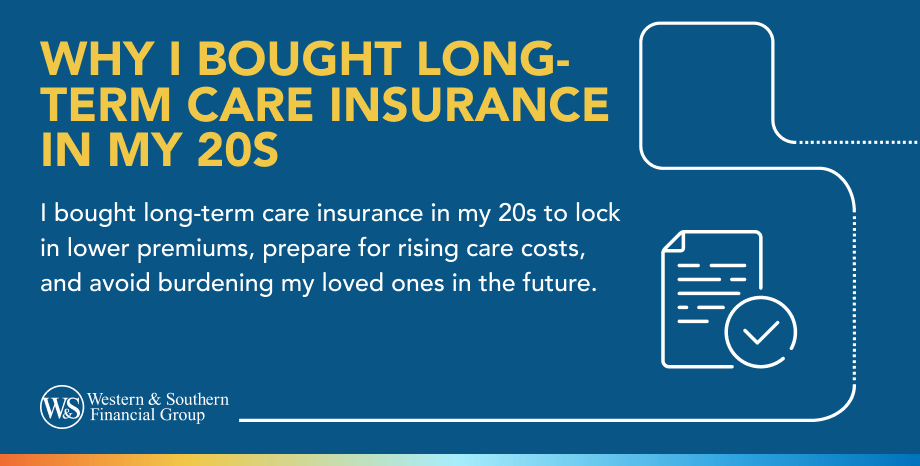Table of Contents
Table of Contents


Key Takeaways
- Long-term care insurance helps cover costs of assisted living, nursing homes, home health aides if you become unable to care for yourself.
- Buying at a young age locks in lower premiums that will never increase.
- Monthly premiums in your 20s are affordable compared to buying later in life.
- Paying for insurance now prepares for potentially lengthy future care needs as life expectancy rises.
- Having coverage prevents burdening loved ones with care costs, and leaves more assets to heirs.
When you're in your 20s and thinking about money matters, your biggest concerns are probably staying on top of your bills, paying off debt and saving up for something fun. While I was certainly concerned about all of the above, I also decided to purchase long-term care insurance in my late 20s.
What is Long-Term Care Insurance?
Long-term care insurance can help cover out-of-pocket costs associated with assisted living, nursing-home care or other forms of elderly care. This insurance type can help with expenses related to:
- Certain diseases
- Chronic disorders
- Debilitating injuries, including Alzheimer's disease, a stroke or diabetes
Coverage for these diseases varies between long-term care insurance plans Most people who purchase long-term care insurance policies are in their late 50s.1 While I was far from the norm, I'm glad I made this decision.
The Benefits of Youth
In the U.S., the current life expectancy is 74.8 years for men and 80.2 years for women.2 Life expectancy is only projected to increase in the future. If I do need long-term care someday, I may need it for a more extended period of time.
I learned about long-term care insurance during a presentation at my last job. After talking to a financial representative on the phone to get a quote, I was sold. I was only in my late 20s, so my monthly premium was far less than if I had waited to purchase a policy later in life. The amount I pay each month will never change, and I didn't have to go through a lengthy application process.
What's the cost of my long-term care insurance policy? My monthly premium is about $30 per month, but premium costs vary. I did the math and figured that if I keep my coverage for 30 years, it would cost me about $10,800. If I keep my coverage for 40 years, it would be a grand total of about $14,400.
That's certainly not a small chunk of change. The average cost of a home health aide in the U.S. is a little over $25 per hour.3 If you're looking for a private room in a nursing home, the average cost is just under $10,000 per month or $120,000 a year.
These costs are expected to increase in the future. If I ever need long-term care, the insurance would pay for itself in a short period of time.
Caring for My Loved Ones
While I'm single now, if I get married and start a family, I wouldn't want to burden my loved ones with the costs of long-term care. I would want my loved ones (or a charity of my choice) to receive any money I have in savings or investments someday.
My mother is a nurse who works in convalescent care. I witnessed what it's like to be bedridden for long periods of time firsthand. It made me realize at an early age how imminent aging and illness can be. It also made me understand what I would like my standard of living to be if I fall ill and need help with everyday tasks in the future.
Yes, my friends think I'm a little unusual for buying a long-term care insurance policy at such a young age, but that's OK. I know the money I spend on this insurance policy could easily go toward things that improve my quality of life today. While it's quite tempting to spend that money on a subscription box service or a dinner out with friends, I'm looking out for my future self and my loved ones.
Lock in affordable long-term care insurance for future needs. Get My Free Financial Review
Sources
- At What Age Should You Buy Long-Term Care Insurance? https://www.agingcare.com/articles/age-to-buy-long-term-care-insurance-143437.htm.
- Life Expectancy. https://www.cdc.gov/nchs/fastats/life-expectancy.htm.
- What Are The Real Costs of In-Home Care? https://aging.com/in-home-care-costs-breakdown/.



